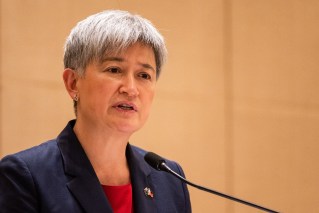‘I don’t know’: Finance Minister’s honest admission about PwC tax scandal

Nearly one week after the police were called, the government cannot directly say if it can stop doing business with a firm whose ex-CEO allegedly leaked Australian tax secrets.
It’s eight years since Peter-John Collins, an executive at PricewaterhouseCoopers (PwC), allegedly passed the confidential policy to colleagues advising clients on the other side of the fence: Multinationals that minimise tax.
PwC Australia chief executive Tom Seymour stood down earlier in May.
Some 80 per cent of Australians think such a leak should result in an instant ban for PwC, a poll found this month.
But on Tuesday, senior public service officials gave varying accounts of whether the firm, PwC, had been – or could be – banned for the alleged breach.
Greens Senator Barbara Pocock pressed Finance Minister Katy Gallagher on whether her department’s pledge to ban any executive involved meant they were banned from winning future work.
That was nearly eight years ago, that a “transaction” involving the policy secrets took place, Senator Pocock said.
“Are you asking us to trust you, to trust PwC?” she asked.
Senator Katy Gallagher admitted it’s still not clear how many executives are alleged to have been involved in the scheme.
Senator Gallagher said rumours of a list of executives implicated in the affair seemed to vary the number of names included.
Nor, she said, was it clear that it extended to anyone “who had knowledge of the cover-up”.
“I don’t know,” Senator Gallagher said. “I don’t think anyone does.”
Fingers in many pies
On Tuesday different mandarins had different answers about their department’s moves to impose a ban in response to a scandal still veiled in secrecy and involving a company so embedded in the public sector.
Matt Yannopoulos, the Associate Secretary of the Department of Defence, told a different committee that PwC was currently engaged to deliver $223 million worth of projects, or more than 50 individual contracts.
PwC will provide “seven or eight” staff for the department’s “cyber warfare division”; it is helping to implement a program at a cost of $3.6 million, the committee heard.
Treasury Secretary Steven Kennedy noted that the firm served a useful role for his department.
“We need people to provide insights into how the tax system works,” he said.
Dr Kennedy said he took confidence from the government announcing it had committed to a review of the Tax Practitioners Board and a strengthening of the finance department procurement protocols.
Earlier, a departmental official was asked: How many current or former partners at PwC were at the firm?
The official replied that it was difficult to say because an unknown number were “on continuing payments”.
It was not until last year that the AFP first alerted Treasury to the affair, an official notice sent one year after its first “request for confidential communication” over the matter, one official said.
Difficult to tame
Tuesday’s broader theme was the many ways PwC generated the $3 billion it brought in last financial year seem to make it so difficult to tame, be it the breadth of work, the alleged revolving door, or its status as auditor to the Treasury.
The education, employment and workplace committee heard that large companies were increasingly using their corporate structures to use their own labour-hire arrangements.
One of PwC’s business lines is called the “enabling function” and it involves providing personnel or expertise to government departments.
In 2020-21, PwC’s local consulting arm, PricewaterhouseCoopers Aseanz Consulting Pty Ltd, paid less than $2 million in tax off $775 million revenue, according to ATO corporate transparency data published online.
Its financial advice, audit and “enabling” business arms are separate entities.
A spokesman for the firm claimed its affairs had been reviewed by a former ATO official in 2021; the tax office was contacted for comment.
Kristin Stubbins, acting chief executive at PwC, admitted they could have done more.
“We recognise that our stakeholders want more transparency in order to restore confidence in our firm,” she said.
Nine PwC partners had been directed to go on leave, effective immediately, while the chairs of its governance board and its designated risk committee had stepped down of their own accord.







